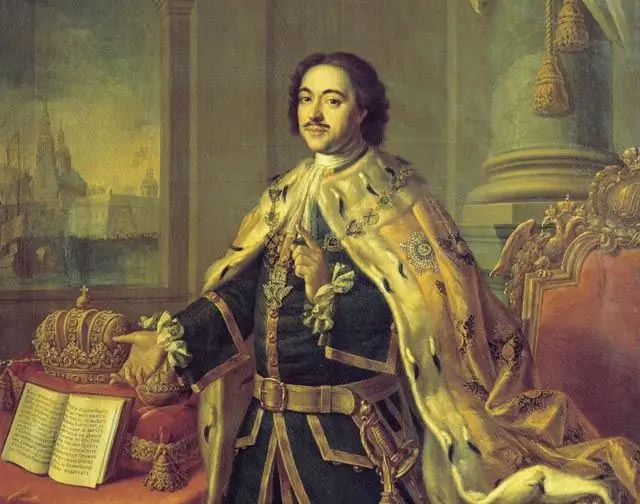- Author Antonio Harrison harrison@cultureoeuvre.com.
- Public 2023-12-16 07:44.
- Last modified 2025-01-22 21:44.
The death of Peter the Great and the absence of an heir appointed by him led to a series of palace coups in Russia in the 18th century. But maybe the tsar still managed to transfer the Russian throne and bequeath the supreme power, but his will was prevented …

In 1722, Tsar Peter I adopted a decree on succession to the throne, which changed the procedure for the transfer of supreme power in the country. From now on, any person could become the heir to the throne at the will of the monarch. The reason for the king's adoption of such a decree was the absence of male heirs by that time.
Two years later, in 1724, Peter crowned his wife Catherine as Empress, confirming that she would become the heir to the throne after his death. But the plans of the emperor are ruined by the adultery of his wife, about which the king learns in the same year.
Peter again faces the choice of the heir to the throne.
In January 1725, the emperor dies. Before his death, he asks for a sheet of paper with a pen and writes "Give everything …".
Official sources say that in addition to these two words, there were others, but they could not be made out. It's strange, isn't it, two words are clear, the rest are not. Or maybe they weren't taken apart on purpose. Perhaps the paper contained the name of Peter Alekseevich, the grandson of Peter I, whose heir neither Catherine nor her inner circle, headed by Peter's colleague, Prince A. D. Menshikov.
The very words “Give it all” seem strange too. What did Peter mean by the word "everything" - power, throne, or something else.
Maybe with this paper the emperor, as husband and father, bequeathed only his property to his wife and daughters Anna and Elizabeth, and the will of succession to the throne was drawn up earlier, since Peter's illness was not sudden, and he realized that he would soon die, and therefore, with the appointment of an heir, it is necessary hurry.
Indeed, today there is still a version that the tsar, before his death, nevertheless appointed a successor for himself, having drawn up a will about this, but it somehow disappeared.
Whatever it was, but for some reason the absence of the last will of the emperor led to a palace coup and the coming to power of Peter's wife, Catherine.






